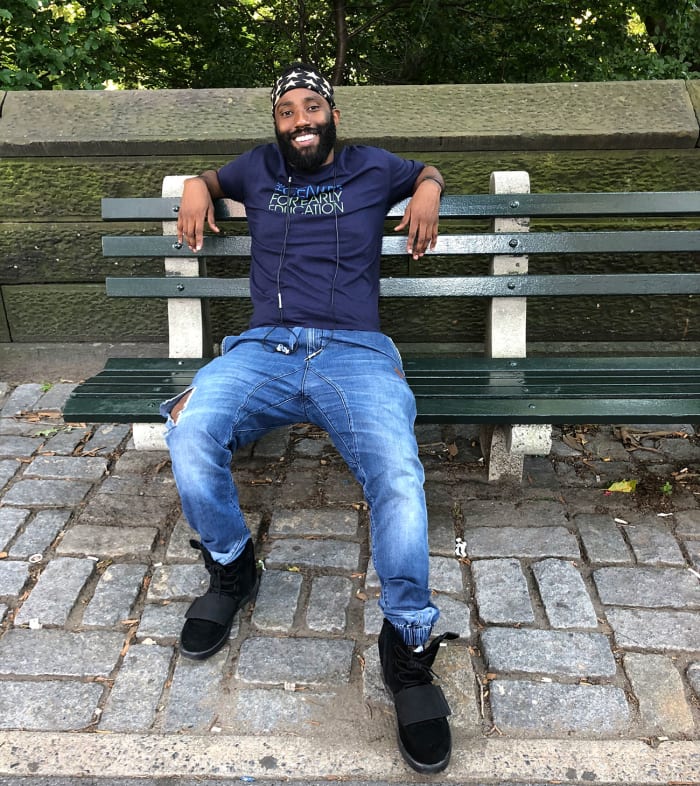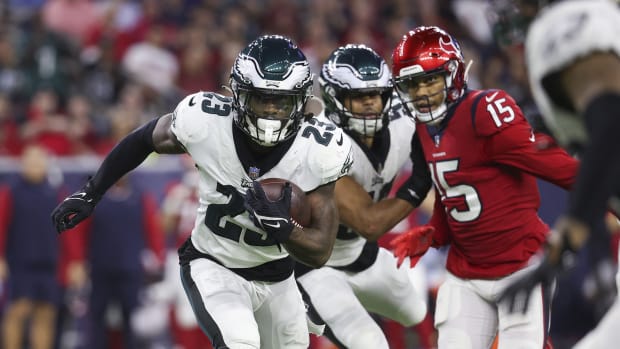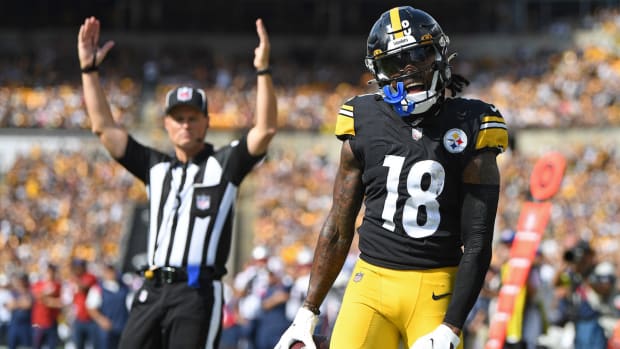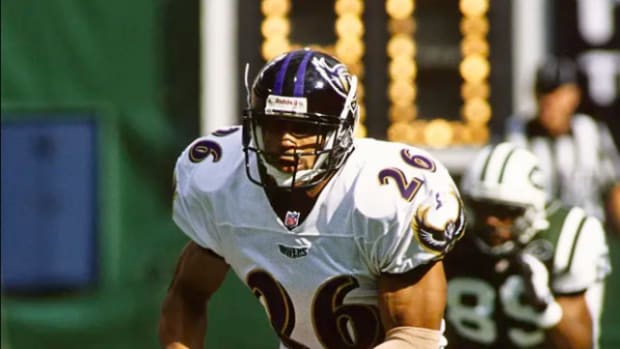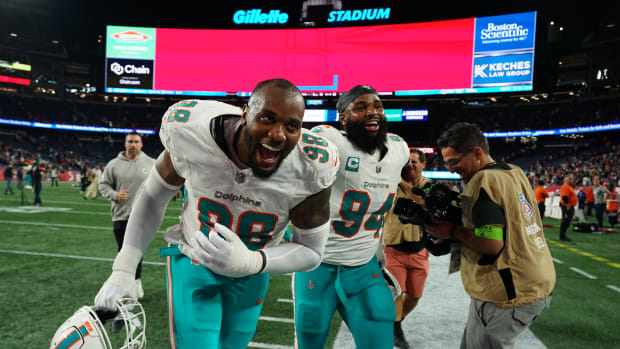John David Washington: From NFL Practice Squad to Spike Lee’s Leading Man
John David Washington wants to walk. It’s a Friday afternoon in July, a month post-surgery, and the ex-football player hasn’t been able to get out of his parents’ Central Park West apartment in weeks. But finally he is starting to feel better, so we walk.
The actor has been mostly bedridden since the surgery, unable to lift anything heavier than 10 pounds, the injury being the last vestige remaining of his football career, his past life. Not the broken ribs, or the torn meniscus, or the five concussions, or even the fortuitous Achilles tear—those have all since healed. It’s the sports hernia, the one that he had been putting off fixing for years, that is still ailing him now.
“The NFL’s parting gift to me,” Washington says. “Like, here you go, sir, take this hernia. Take that with you.”
We head out of the lobby of the luxury apartment complex, with English oak paneling and fluted marble pillars, into the sun-soaked streets. “We got it, we got it,” he says, crossing a busy intersection without waiting for the light, spry enough to dodge a couple of cars, leading the way towards Central Park. His gait is slowed slightly as a result of the surgery—four separate operations, each removing a different piece of his intestines. Washington originally sustained the injury in 2007, his second season on the St. Louis Rams’ practice squad. But when the team’s trainers diagnosed him, he denied it, refusing to stop practicing; he knew it would be the end of his NFL dream, and he wasn’t ready to go back home, not yet.
“I’m already on the practice squad, then I’m on IR?” he says. “No thank you. I’m going to play through this. Ain’t nothing wrong with me, coach.”
If you could hear Washington’s voice as he says these words, the distinct pauses and inflections, the casual insouciance, or could watch him walk down these New York City streets, Stars and Stripes bandana wrapped around his head, bushy beard and constant wry smile on his face, the understated swagger, there’s a good chance you would think it was all very familiar to you. Despite a lifetime of trying to distance himself as far from his father’s name as he could, John David Washington walks, talks, and yes, acts, like his very famous pops. Yet here, on the densely crowded streets around Columbus Circle, he goes unbothered.
John David remembers walking these Manhattan sidewalks when he was five years old, while his dad repeated the same refrain over and over. Now is the winter of our discontent, he would say. They went unbothered on the streets then, too, father and son; one of the last times they’d be able to do that together.
We turn into the entrance of the park, where couples on bikes pedal past and horse-drawn carriages trot by, the same park where John David watched his father stand up on stage and deliver the line that he had practiced, in a Shakespeare in the Park production of Richard III. He was already somewhat prominent, already an Academy Award to his name, but not yet what he would become.
At that time all John David wanted was to act, just like his father; he was already writing, directing and editing his own films on a handheld camcorder. But two years later, dad would land the starring role in Spike Lee’s Malcolm X; that is when Denzel Washington became Denzel Washington and John David Washington became a football player. After Malcolm X, everything in their lives changed—relationships, the way people looked at and treated him. He was no longer John David Washington; now he was Denzel’s son.
Even at 10 years old, Washington was cognizant of this new reality. There was favoritism experienced and skepticism felt, of acquaintances’ motives and their intentions. He felt anger and resentment at this altered dynamic. So Washington dedicated his life to football and filtered all those emotions into the sport; he calls his football career his “positive rebellion,” a way to separate from his father’s name. On the field, he was simply another man with a helmet, one of 22. And when he realized that he was getting attention for being talented and nothing else, he was hooked.
“When I saw that it was about me and not my father, it was like a drug,” Washington says. “I got addicted to that. To being able to be appreciated, separate, independently of a name.”
He would begin his early career as a quarterback, molding himself after Randall Cunningham. In 1996, at age 12, he attended Mack Brown’s football camp at North Carolina, won MVP and was told by the coach that he was special. Then Washington stopped growing, stuck at 5’10”, and switched to running back. He’d go on to receive a football scholarship from Morehouse College, earning his own way through school. When he graduated, he was the school’s all-time leading rusher.
He viewed himself in the Darren Sproles mold, shifty and elusive, but then got his weight up to 215 and thought he could be more like LaDainian Tomlinson, an all-purpose back. But Washington was not selected in the 2006 NFL draft, mostly due, he believes, to his relatively slow 40 time (4.7 seconds) for a back of his size. But he had suitors as an undrafted free agent, and joined the Rams practice squad. There would be no nepotism in the league.
“My father couldn’t help me in that industry,” Washington says. “Probably hurt me, being related to him.”
He jokes that while the normal player gets “your momma” jokes on the field, Washington got the “your daddy” jokes. Most of it was filtered through adoration—“I love your daddy, man, but I’m gonna whoop your ass.” While some of it was just constant quoting of movie lines—“KING KONG AINT GOT S--- ON ME.” What bothered him were when others felt he didn’t need the job, didn’t need the opportunity; he’d be fine without it. To him, he says, “going back home was worse than going back to the ’hood.” That would mean he failed.
So he played through cracked ribs and knee pain, through multiple concussions and the sports hernia. He lived the wholly unglamorous grind of an NFL practice squad player, a life of zero job security and constant physical toil during the week, only to not suit up with the team on Sundays. During his first season, in the Rams’ first preseason game, backed up on their own goal line, Washington rushed for nine yards on his first NFL carry. “But that was about it,” he says. The majority of the opportunities he got after that play came on special teams.
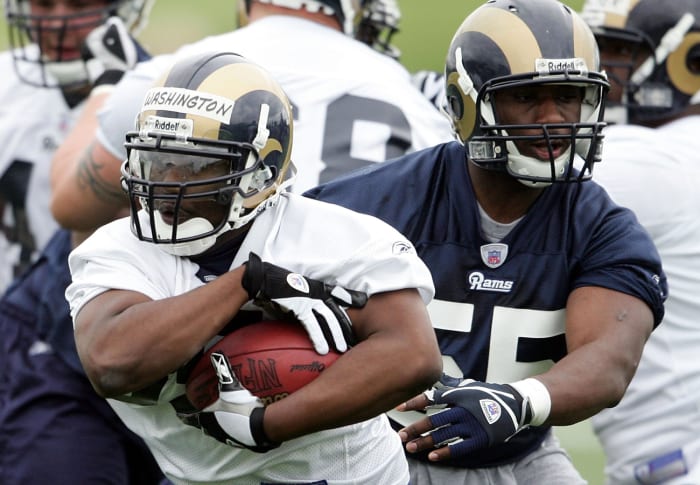
Washington earned a free-agent contract with the Rams after going undrafted out of Morehouse, where he was the school’s all-time leading rusher.
Getty Images
“Every day in practice, just hoping to get a chance,” he says. “Another day to survive and maybe play. Maybe they’ll recognize my hard work.”
After two seasons in St Louis, Washington was cut by the Rams. He caught on in the now defunct UFL on the California Redwoods (later the Sacramento Mountain Lions). There, Washington would play for former Vikings and Cardinals coach Dennis Green, alongside former Pro Bowl quarterback Daunte Culpepper. During his second season, Washington got his first chance to start, and rushed for 120 yards and a touchdown. But the opportunities were rare. For four seasons he was simply grinding for opportunities, a backup refusing to return home. Sometimes his dad would stand on the sideline and watch him play.
In 2013 Washington was training at ProActive Sports in Westlake Village, Calif., with a group of other NFL players; he was still fighting to get back into the league and had a workout with the Giants coming up. But during a routine drill, Washington felt a pop. When the doctor told him later that it was a torn Achilles, he cried. Flashbacks of his career played in his mind. He knew football was finished.
“It was a death row sentence,” Washington says. “I’m 28 years old, as a running back, it’s over.”
Now there was fear of the unknown, of attempting to do the one thing he had always known he wanted to do but couldn’t before admit. He understood that if he went into acting, his fate would be binary. Either he would be good at it and everyone would say, of course he’s good, his dad is Denzel. Or he’d be bad at it, and they’d say the only reason he got the role was because of his dad—how embarrassing. Still, he knew he’d have to try.
Not long after undergoing surgery on the Achilles, Washington got a call from an old friend, Andrew Finkelstein, who was now a Hollywood talent agent. Years earlier Washington had told Finkelstein that he wanted to act. Finkelstein remembered. Now, the agent claimed, he had the perfect role. There was a new HBO show called Ballers, starring Dwayne “The Rock” Johnson, that was being cast, and they were looking for a young actor to portray a football player. Washington didn’t want to audition; he wanted to go to acting school and study the craft. But Finkelstein told him to just go and start getting used to rejections—Washington responded that his football career made him all too familiar with that experience. But he went, still on painkillers from the surgery.
“I was loopy loopy, but I was loose,” Washington says. “And 10 auditions later I got the role.”
The actor deliberately did not do any press or promotion during the early years of the show. He was an unknown … until he wasn’t. At one point, about midway through the first season, thousands of television fans somewhat concurrently found out that the actor playing Ricky Jerret, the show's breakout star, was Denzel Washington’s son. That’s how he preferred it.
“I didn’t want people to know who I was,” Washington says. “I didn’t want it to interfere with the work. Either people connect with it or don’t connect with it. At least it will be the guy that they don’t like or do like. It won’t be the son of somebody.”
On the show, Washington plays a troubled wide receiver, “action-packed with issues,” as he puts it. Ballers, which will begin a fourth season on August 12, quickly became HBO’s most watched comedy series in years. It follows the life of a former NFL player, Johnson, who becomes a financial manager for athletes, and the lives of the stars that he works with—including Washington’s character. What attracted Washington most to the role was that the show is based on real stories, real issues that he knew NFL players deal with.
“It humanizes them,” Washington says. “The show gives a fun insight into how the business is and how the players get treated.”
That role led to others, including a small supporting part in Old Man and the Gun, starring Robert Redford, which will be released in late September. While in Cincinnati filming that movie, Washington received a text from the man he calls Uncle Spike. Director Spike Lee had cajoled a seven-year-old Washington onto the big screen first, giving him one line at the very end of Malcolm X, and now Lee wanted to send the actor a book. “Read it,” Lee texted. Washington did. The book was Black Klansman, a memoir by Ron Stallworth detailing the story of how the first black detective in the history of the Colorado Springs Police Department infiltrated the Ku Klux Klan. Lee was making it into a movie and wanted Washington to play the lead role. There wouldn’t be 10 auditions this time.
The film, titled BlacKkKlansman, which was produced by Academy Award winner Jordan Peele and will be released on August 10, received a standing ovation at Cannes, winning the festival’s second most prestigious award. It has received rave reviews—a 96% rating on Rotten Tomatoes, for those who care about such things— and there is already early Academy Award buzz. To put on a movie critic hat for a moment, it is easily Spike’s best joint in years, up there with his best ever, equal parts chilling and uplifting, both humorous and distressing, expertly directed, with jarring tonal dissonances that create moments of dark humor. And, most significantly, the movie is of critical importance for our country in the year 2018.
Washington, only five years removed from his final football game, now has four movies set to be released in the coming year. It is clear that he has all the requisite qualities needed to become Hollywood’s next star—the looks, the charisma, the ability, and yes, even the pedigree. The actor, however, repeatedly says he still has much to learn and that right now he is simply trying to get more experiences, more reps, more opportunities. Despite all the success he’s already found, he says he’s just starting to get the hang of this acting thing. But unlike in football, where just as the game finally begins to slow down and become easier, your body breaks down, in acting, as you get older “the roles seem to get better, you become calmer and more confident in your abilities,” he says. Meaning he’s only going to get better.
“People that have connected with the stuff now, thank god for them, thank you, keep watching,” Washington says. “But if they connect and like what I’m doing now, you ain’t seen nothing yet.”
Still, Washington points out that right now he is “an unemployed actor.” It’s a phrase that comes from a place of pride more than anything else. Unemployed or not, he is inarguably an actor now. He has found what he wants to do for the rest of his life. It was never actually football.
“This is my life,” he says. “My appreciation and love comes from not the glitz and glamor of it, but the process of it. The work and the craft. That’s what I connect to and love. It’s a part of me. It’s like breathing.”
We have walked twenty blocks north and Washington takes a seat on a bench just outside the park. He’s asked how Denzel has responded to his acting career, and he says his father doesn’t really watch his work and that he’d be surprised if he sees BlacKkKlansman, despite all the hype. Dad is his toughest critic, he “has his own love language,” Washington says; his most common advice is “you ain’t done nothing yet.”
But the actor also wants to make clear that he is unequivocally not complaining. “I had a father who was active, present,” he says. “There are people out there that never knew their fathers, didn’t have their father’s support. If I were to complain, that would be real sad. How dare I?”
Asked if he ever envisions a day where his dad will tell him that he was fantastic in a role, he quickly responds in the negative. He wants to manage his expectations, doesn’t want to hang on that possibility, waiting for it to happen. I ask what people get wrong about him most often.
“Denzel’s son,” he says. “They think I don’t work for this.”
A twenty-something woman walking briskly past the bench does a double take when she sees Washington sitting there. She has seen the advertisements for the movie— commercials on TV, posters of his face plastered in subway stations—and recognizes him. But she doesn’t know his name.
“Aren’t you in that new Spike Lee movie?” she asks, stopping abruptly.
“Yes ma’am,” John David responds.
“Nice to meet you.”
“Pleasure to meet you.”
‘You have beautiful teeth. Can I take a picture?”
“No problem.”
“I really don’t do that kind of stuff, but you’re too beautiful to pass up. I want them to see this fine brother.”
I snap a photo of the two of them standing beside the bench, smiling, the sun warming their faces, movie star and fan. She gives John David a hug and wishes him luck on the movie opening. August 10, he reminds her.
“I’m so proud of you,” she says, before continuing down the Manhattan sidewalk.
Question or comment? Email us at talkback@themmqb.com.
































